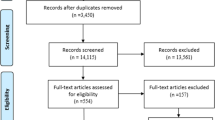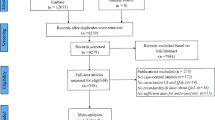Abstract
Objective
To describe quality of life (QOL) and survival outcomes following pelvic exenteration (PE) in old and young patients.
Background
PE is a management option for complete resection in locally advanced pelvic cancers. Few studies have examined the impact of age on the outcome in elderly patients following PE.
Patients and Methods
Prospective cohort of consecutive patients undergoing partial and complete PE between 1994 and 2019. Patients were divided into a younger (< 65 years) or older cohort (≥ 65 years) based on their age. QoL was assessed using the SF-36 and FACT-C questionnaires and survival estimated using the Kaplan–Meier method.
Results
For 710 patients who underwent PE during the study period, FACT-C total score was significantly better in the elderly during the whole follow-up period of 5 years. Mental component score (SF-36) was significantly better at baseline (p = 0.008) and at 24 months postoperatively (p = 0.042), in the elderly group. Median overall survival was 75 months in the younger cohort and 53 months in the older cohort (p = 0.004). In subgroup analysis, older patients with recurrent or primary rectal cancer had a median survival of 37 and 70 months, respectively. Postoperative cardiovascular complications were greater in the elderly cohort (p < 0.001).
Conclusions
Elderly patients had better overall QoL but lower survival that is probably related to cardiovascular complications rather than to cancer as both groups had similar R0 resection rate. Hence, the elderly population should be considered equally for PE.




Similar content being viewed by others
References
Vermaas M, Ferenschild FT, Verhoef C, et al. Total pelvic exenteration for primary locally advanced and locally recurrent rectal cancer. Eur J Surg Oncol. 2007;33:452–8.
Kecmanovic DM, Pavlov MJ, Kovacevic PA, et al. Management of advanced pelvic cancer by exenteration. Eur J Surg Oncol. 2003;29:743–6.
Lopes A, Poletto AH, Carvalho AL, et al. Pelvic exenteration and sphincter preservation in the treatment of soft tissue sarcomas. Eur J Surg Oncol. 2004;30:972–5.
de Wilt JH, van Leeuwen DH, Logmans A, et al. Pelvic exenteration for primary and recurrent gynaecological malignancies. Eur J Obstet Gynecol Reprod Biol. 2007;134:243–8.
Kontovounisios C, Kinross J, Tan E, et al. Complete mesocolic excision in colorectal cancer: a systematic review. Colorectal Dis [Internet]. 2015;17:7–16.
Selvaggi F, Fucini C, Pellino G, et al. Outcome and prognostic factors of local recurrent rectal cancer: a pooled analysis of 150 patients. Tech Coloproctol. 2015;19:135–44.
Rottoli M, Vallicelli C, Boschi L, et al. Outcomes of pelvic exenteration for recurrent and primary locally advanced rectal cancer. Int J Surg. 2017;48:69–73.
Brown KGM, Solomon MJ, Koh CE. Pelvic Exenteration surgery: the evolution of radical surgical techniques for advanced and recurrent pelvic malignancy. Colon Rectum. 2017;60:745–54.
Simillis C, Baird DL, Kontovounisios C, et al. A systematic review to assess resection margin status after abdominoperineal excision and pelvic exenteration for rectal cancer. Ann Surg. 2017;265:291–9.
Turrentine FE, Wang H, Simpson VB, et al. Surgical risk factors, morbidity, and mortality in elderly patients. J Am Coll Surg. 2006;203:865–77.
Surgery for colorectal cancer in elderly patients. a systematic review Colorectal Cancer Collaborative Group. Lancet. 2000;356:968–74.
Matthews CM, Morris M, Burke TW, et al. Pelvic exenteration in the elderly patient.Obstet Gynecol. 1992;79:773–7.
Fotopoulou C, Neumann U, Kraetschell R, et al. Long-term clinical outcome of pelvic exenteration in patients with advanced gynecological malignancies. J Surg Oncol. 2010;101:507–12.
Berek JS, Howe C, Lagasse LD, et al. Pelvic exenteration for recurrent gynecologic malignancy: survival and morbidity analysis of the 45-year experience at UCLA. Gynecol Oncol. 2005;99:153–9.
Maggioni A, Roviglione G, Landoni F, et al. Pelvic exenteration: ten-year experience at the European Institute of Oncology in Milan. Gynecol Oncol. 2009;114:64–8.
Benn T, Brooks RA, Zhang Q, et al. Pelvic exenteration in gynecologic oncology: a single institution study over 20 years. Gynecol Oncol. 2011;122:14–8.
Hagemans JAW, Rothbarth J, Kirkels WJ, et al. Total pelvic exenteration for locally advanced and locally recurrent rectal cancer in the elderly. Eur J Surg Oncol. 2018;44:1548–54.
Rutten H, den Dulk M, Lemmens V, et al. Survival of elderly rectal cancer patients not improved: analysis of population based data on the impact of TME surgery. Eur J Cancer. 2007;43:2295–300.
Huang M, Iglesias DA, Westin SN, et al. Pelvic exenteration: impact of age on surgical and oncologic outcomes. Gynecol Oncol. 2014;132:114–8.
Radwan RW, Evans MD, Davies M, et al, Swansea Pelvic Oncology G. Pelvic exenteration for advanced malignancy in elderly patients. Br J Surg. 2016;103: e115-119.
World Health Organization. Definition of an Older or Elderly Person. Available from: http://www.who.int/healthinfo/survey/ageingdefnolder/en/
The Australian Institute of Health and Welfare. Older Australia at a glance. 2018.
The Australian Bureau of Statistics (ABS). 2071.0 - Reflecting a Nation: Stories from the 2011 Census, 2012–2013. 2012.
Austin KK, Young JM, M J Solomon. Quality of life of survivors after pelvic exenteration for rectal cancer. Dis Colon Rectum. 2010; 53: 1121–1126.
Ware JE, Sherbourne CD. The MOS 36-item short-form health survey (SF-36). I. Conceptual framework and item selection. Med Care. 1992; 30:473–483.
Ward WL, Hahn EA, Mo F, et al. Reliability and validity of the Functional Assessment of Cancer Therapy-Colorectal (FACT-C) quality of life instrument. Qual Life Res. 1999;8:181–95.
Young JM, Badgery-Parker T, Masya LM, et al. Quality of life and other patient-reported outcomes following exenteration for pelvic malignancy. Br J Surg. 2014;101:277–87.
Cella D. FACT-C (Functional Assessment of Cancer Therapy – Colorectal). The Functional Assessment of Chronic Illness Therapy (FACIT) measurement system: version 4. 2003.
Maruish M, editor. User’s Manual for the SF-36v2(R) Health Survey (3rd edn). QualityMetric: Lincoln; 2011.
Martinez A, Filleron T, Rouanet P, et al. Prospective assessment of first-year quality of life after pelvic exenteration for gynecologic malignancy: a French multicentric study. Ann Surg Oncol. 2018;25:535–41.
Rausa E, Kelly ME, Bonavina L, et al. A systematic review examining quality of life following pelvic exenteration for locally advanced and recurrent rectal cancer. Colorectal Dis. 2017;19:430–6.
Roos EJ, de Graeff A, van Eijkeren MA, et al. Quality of life after pelvic exenteration. Gynecol Oncol. 2004;93:610–4.
Thong MSY, Doege D, Koch-Gallenkamp L, et al. Age at diagnosis and sex are associated with long-term deficits in disease-specific health-related quality of life of survivors of colon and rectal cancer: a population-based study.Dis Colon Rectum. 2019;62(11):1294–304.
Janssen-Heijnen ML, Maas HA, Houterman S, Lemmens VE, et al. Comorbidity in older surgical cancer patients: influence on patient care and outcome.Eur J Cancer. 2007;43:2179–93.
Soerjomataram I, Thong MSY, Ezzati M, et al. Most colorectal cancer survivors live a large proportion of their remaining life in good health. Cancer Causes Control [Internet]. 2012 [cited 2020 May 10];23:1421–1428. Available from: https://www.ncbi.nlm.nih.gov/pmc/articles/PMC3415614/
Bhangu A, Ali SM, Brown G, et al. Indications and outcome of pelvic exenteration for locally advanced primary and recurrent rectal cancer.Ann Surg. 2014;259:315–22.
Author information
Authors and Affiliations
Corresponding author
Ethics declarations
Disclosure
The authors declare no conflict of interest.
Additional information
Publisher's Note
Springer Nature remains neutral with regard to jurisdictional claims in published maps and institutional affiliations.
Rights and permissions
About this article
Cite this article
Alahmadi, R., Steffens, D., Solomon, M.J. et al. Elderly Patients Have Better Quality of Life but Worse Survival Following Pelvic Exenteration: A 25-Year Single-Center Experience. Ann Surg Oncol 28, 5226–5235 (2021). https://doi.org/10.1245/s10434-021-09685-6
Received:
Accepted:
Published:
Issue Date:
DOI: https://doi.org/10.1245/s10434-021-09685-6




